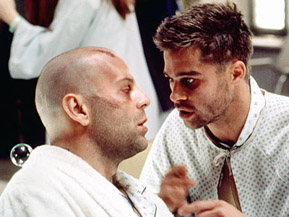Viking Night: 12 Monkeys
By Bruce Hall
February 16, 2011
Most consumers have no problem loving a huge budget blockbuster. Movies that are meant to appeal to the widest possible audience usually do just that. But some films have a narrower vision, or simply contain more complex meaning than meets the eye. They aren't always art, and they aren't always even very successful. But for a devoted and eccentric few, they're the best entertainment money can buy. Once, beginning with Erik the Viking, a group of dedicated irregulars gathered weekly in a dingy dorm room to watch these films and discuss how what pleases the few might also appeal to the many. Time has separated the others in those discussions so that I alone remain to ponder the wider significance of cult cinema. But while the room is cleaner and I no longer have to skip class to do it, I still think of my far off friends whenever I hold Viking Night.
Show me a time travel movie and most of the time, I’ll show you a piece of lazy storytelling filled with boring characters and dull clichés. Time travel has always been a staple of both good and bad science fiction, and for good reason. In the right hands, it can be the ultimate storytelling device, opening doors to things that couldn’t be done otherwise. And of course in the wrong hands it’s just a bad writer’s gimmick used to compensate for lack of skill - or even worse, to create the worst type of story there is, drama without consequences. Twelve Monkeys doesn’t entirely steer clear of every genre pitfall, but what it does manage to do is tell a time travel story in a manner that makes the time traveling seem beside the point. And to me, that’s the best kind of time travel story there is.
It turns out that 1996 was a far more momentous year than I remember. In America, a major snowstorm crippled the Midwest (sounds familiar). Charles and Diana were divorced. Brett Favre was the NFL’s Most Valuable Player. And then there was the virus outbreak that killed five billion people, forcing the entire human race underground - my, how time flies. Eventually scientists developed a way to send individuals back in time, trying to find the source of the contagion so they could either prevent the disaster, or return with a pure sample and cook up a cure. Because civilization collapsed so quickly, the only information on the virus’ origin had to do with a suspected terrorist group called The Army of the Twelve Moneys. Because of the dangerous nature of time travel, convicts are used for the missions and they are called "volunteers," despite the fact there’s nothing "optional" about it. James Cole (Bruce Willis) is one of these "volunteers," a soft spoken sad sack who seems less like a criminal and more like Forrest Gump’s cynical cousin. The film never specifies what he did to earn his prison time but when we meet him he seems more like a submissive dope than a violent offender. It won’t take long for this to change.
Continued:
1
2
3
|
|
|
|




